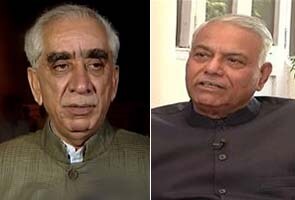
New Delhi:
The political magnitude of its agenda is so considerable that the government fought for months to avoid constituting a parliamentary commission to study the 2G spectrum scam.
But a sustained and united campaign by the Opposition forced the government to surrender, and now it's time for the 30 members of Joint Parliamentary Committee to get to work. The majority are MPs of the Congress and its allies. As the main Opposition party, the BJP has six members, and they've proved to be a controversial choice.
Telecom Minister Kapil Sibal moved a motion in the Rajya Sabha for the setting up of a Joint Parliamentary Committee (JPC). So far, India has only seen four JPCs in its political history; the most recent studied the Bofors scam in 1987. The issue was whether senior Indian politicians got massive kickbacks from a Swiss arms manufacturer named Bofors in return for a 15 billion dollar contract.
The telecom scam, according to the government's auditor, may have cost India upto Rs 1.76 lakh crore. It saw companies getting mobile network licences at throwaway prices from former Telecom Minister A Raja, who is now in jail. Since the auditor presented its report in November, the telecom controversy has battered the government on a near-daily basis.
Mr Sibal in Parliament today echoed the line of defence that the Prime Minister has taken in recent weeks -that the basic policies followed for the allocation of 2G spectrum in 2008 were not faulty, but their implementation was faulty. The first-come first-serve policy - which was chosen instead of an auction of valuable spectrum - is the main reason for India turning into a nation of cellphone users, said Mr Sibal. "The process of implementation was manipulated," said Mr Sibal.
The BJP was not impressed. "I cannot hide my disappointment with Mr Sibal's opening remarks," said the party's Arun Jaitley, "they had an inbuilt rationalization" of the telecom scam.
But the BJP, which has for months taken the moral high ground on the 2G scam, is now on a slippery slope. The JPC will examine all allocation of spectrum from 1998 to 2009. The BJP-led National Democratic Alliance (NDA) was in power from 1998-2004. Jaswant Singh and Yashwant Sinha both served as Finance Minister during this period, and both are now among the BJP's six delegates on the Joint Parliamentary Committee.
The Congress say that's a conflict of interest - Mr Singh and Mr Sinha were senior members of teams that decided telecom policies that are now under scrutiny. To underscore the point, the Congress highlighted that its Abhishek Manu Singhvi, who is a prominent lawyer, refused to serve on the committee because in recent years, he has represented telecom operators in court on the contentious issue of spectrum allocation.
The BJP's worry is that other parties represented on the Joint Parliamentary Committee will join the chorus against the BJP.
"There is a point in what the Congress is saying - but it should have objected earlier," said the Left's Sitaram Yechury.
But a sustained and united campaign by the Opposition forced the government to surrender, and now it's time for the 30 members of Joint Parliamentary Committee to get to work. The majority are MPs of the Congress and its allies. As the main Opposition party, the BJP has six members, and they've proved to be a controversial choice.
Telecom Minister Kapil Sibal moved a motion in the Rajya Sabha for the setting up of a Joint Parliamentary Committee (JPC). So far, India has only seen four JPCs in its political history; the most recent studied the Bofors scam in 1987. The issue was whether senior Indian politicians got massive kickbacks from a Swiss arms manufacturer named Bofors in return for a 15 billion dollar contract.
The telecom scam, according to the government's auditor, may have cost India upto Rs 1.76 lakh crore. It saw companies getting mobile network licences at throwaway prices from former Telecom Minister A Raja, who is now in jail. Since the auditor presented its report in November, the telecom controversy has battered the government on a near-daily basis.
Mr Sibal in Parliament today echoed the line of defence that the Prime Minister has taken in recent weeks -that the basic policies followed for the allocation of 2G spectrum in 2008 were not faulty, but their implementation was faulty. The first-come first-serve policy - which was chosen instead of an auction of valuable spectrum - is the main reason for India turning into a nation of cellphone users, said Mr Sibal. "The process of implementation was manipulated," said Mr Sibal.
The BJP was not impressed. "I cannot hide my disappointment with Mr Sibal's opening remarks," said the party's Arun Jaitley, "they had an inbuilt rationalization" of the telecom scam.
But the BJP, which has for months taken the moral high ground on the 2G scam, is now on a slippery slope. The JPC will examine all allocation of spectrum from 1998 to 2009. The BJP-led National Democratic Alliance (NDA) was in power from 1998-2004. Jaswant Singh and Yashwant Sinha both served as Finance Minister during this period, and both are now among the BJP's six delegates on the Joint Parliamentary Committee.
The Congress say that's a conflict of interest - Mr Singh and Mr Sinha were senior members of teams that decided telecom policies that are now under scrutiny. To underscore the point, the Congress highlighted that its Abhishek Manu Singhvi, who is a prominent lawyer, refused to serve on the committee because in recent years, he has represented telecom operators in court on the contentious issue of spectrum allocation.
The BJP's worry is that other parties represented on the Joint Parliamentary Committee will join the chorus against the BJP.
"There is a point in what the Congress is saying - but it should have objected earlier," said the Left's Sitaram Yechury.
Track Latest News Live on NDTV.com and get news updates from India and around the world

